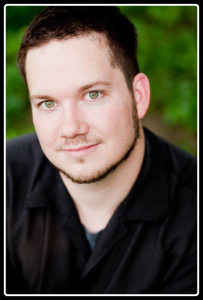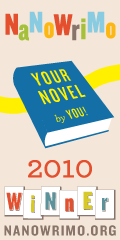 At this point, you’ve got my NaNoWriMo review, and you’ve got Courtney’s, and if you’re following any other writers’ blogs (as you probably should be), you’ve got a lot more. NaNoWriMo is all about not looking ahead, and not looking back, but just looking right at the blinking cursor at the end of your document. The moment it’s over, though, that all changes.
At this point, you’ve got my NaNoWriMo review, and you’ve got Courtney’s, and if you’re following any other writers’ blogs (as you probably should be), you’ve got a lot more. NaNoWriMo is all about not looking ahead, and not looking back, but just looking right at the blinking cursor at the end of your document. The moment it’s over, though, that all changes.
I finished a book (and a screenplay, and got a good start on another book). Courtney hit 50k early for the first time, but she’s still got to write half that again to get to “The End.” My dad got a couple thousand words in before a long-malingering home renovation demanded all his free time, so he’s postponed his personal NaNoWriMo to January.
So where are you? One of the most important parts of NaNoWriMo is getting to the end of it (no matter where you end up), and then investing a little time to really take stock.
Getting to the End
NaNoWriMo has two dark secrets that we try really hard not to talk about during the month of November. The first is unarguably a positive one, but it can be inconveniently positive. It goes like this:
Whether or not you hit 50k, if you got a lot of writing done in November that’s something worth celebrating.
If you focus on that during November, it’s really easy to back off the intensity and let the month get away from you. So those veterans among us, even though we know it deep in our hearts, we try to keep it unspoken and maybe distract the novices so they never think it through. Because, of course, getting more words is always better. And getting those last two is best.
In the long run, though, it doesn’t matter. There’s nothing magical about November 30. If you got 5,000 words written in November, you’ve got a solid chapter or two and a real foundation for a book. If you got 500 words, you’ve got a scene. You’ve got a starting spot.
It’s not a good idea to be satisfied with that. As I said over the course of the last month, if you really want to be a writer you’ve got to get to “The End.” But no matter what your final word count was, everything you did in November got you closer to that.
Take stock, figure out what worked for you and what didn’t — what stumbling blocks kept you from following through on your commitment — then develop a plan for handling them and dive right back in.
Getting Right Back In
And that brings us around to NaNoWriMo’s other dirty secret:
Whether or not you hit 50k, you’re not done.
I mean, maybe you are. Maybe your only goal in life was to win a NaNoWriMo. For most of us, though, NaNoWriMo is just a single event within a much larger journey.
If you really want to be a writer, the end of November isn’t any kind of end at all. It doesn’t matter if you got to 50k in 30 days. It doesn’t matter if you got there early. It doesn’t even matter if you got to “The End.” No matter any of that, it’s time to take stock, figure out where you are…and get right back to work.
I wrote “The End” on a novel. I even got in a first revision of it. I wrote nearly 97,000 words in November spread across four creative projects, and you know what? December’s going to demand that I do at least half that just to keep up. November’s certainly a spike for me, but it’s by no means the only time I’m working.
Being a Writer
If that sounds depressing to you, you’re in the wrong line of work. If it sounds like I’m being overly negative…you’re probably absolutely right.
I genuinely celebrated the end of NaNoWriMo. And November is something special. Winning NaNoWriMo is a major accomplishment, and it’s worth taking some time to reward yourself if you managed it.
Writing a rough draft is only part of the process, though. If you got to “The End,” you’ve still got a long way to go. The good news is, the rest is fun. The good news is, now you get to write something beautiful and admirable.
And when you’re done, you get to start all over from scratch. If that sounds depressing, you’re in the wrong line of work. To me, it sounds like endless opportunities to do what I love.










